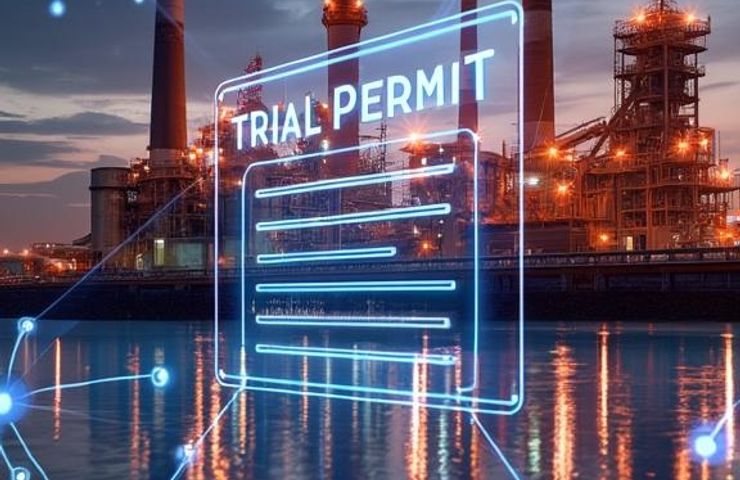
Hydrogen Permitting UK: Fast-Track Trial Permits Ignite Industrial Decarbonization
August 29, 2025Buckle up—the UK’s Industrial decarbonization efforts are about to shift into overdrive. Imagine snagging a permit to fire up hydrogen in your steel furnace in days, not months of slogging through red tape. That’s the idea behind the new Digital risk-based approvals scheme the UK Government and Environment Agency rolled out on 20 August 2025. They’ve just kicked off an eight-week chat on introducing time-limited trial permits for Heavy industry hydrogen trials. This isn’t just cutting corners—it’s the clearest signal yet that Britain is all in for Hydrogen permitting UK.
Your Express Lane to Hydrogen Trials
Picture this: a cement works in Leicestershire, known for belching out CO2, signs up for a 12-month hydrogen burner experiment. Under the fresh system, they file one simple form and get a single permit that covers everything—from running 100% hydrogen to different hydrogen-natural gas blends—no extra paperwork each time you tweak the setup. It’s not just cement either; steel plants in South Wales, refineries along Scotland’s coast, and chemical hubs in the North-West can all jump on board. They can even set up electrolysis-based hydrogen production right next to their existing units, all wrapped up in one permit. No more endless back-and-forth for every new burner or electrolyser.
Best part? This isn’t some pipe dream. Companies can start plotting their projects now, with the first batch of permits expected by mid-2026 during the pilot phase.
Here’s Why It Matters
Let’s call a spade a spade—gaudy, one-off permits have been strangling the UK’s hydrogen momentum. The Corry Review together with experts at SLR Consulting laid bare the pain: one pilot permit could drag on for 17 months, thanks to endless rounds of checks. Each new piece of kit meant a fresh permit application. And while all that was happening, carbon kept pouring out, investors lost patience, and the tech’s edge dulled.
That’s a big deal because heavy hitters like steel, cement, and oil refining alone make up roughly a quarter of the UK’s industrial CO2. Speedier trials mean faster data on how hydrogen performs, how safe it is, and what it costs. Those insights feed straight into business cases for full-scale rollouts, cutting costs and chipping away at emissions quicker. That’s the kind of nimbleness net-zero 2050 demands.
The Permit Makeover: Magic Ingredient Revealed
So what’s the secret sauce? Two game-changing tweaks:
- Facility-wide environmental permits
One permit for your entire site, complete with a clear emissions ceiling. Swap burners, upgrade electrolysers, or play with feedstock blends—all under one roof, no fresh filings every time. - Digital, risk-based approvals
A slick cloud-powered portal grades projects on their environmental and safety risks—think emissions, proximity to water, safety measures, you name it. Low-risk pilots speed through with automated checks. Higher-risk ones get focused manual reviews, slashing the bureaucracy.
These aren’t just ideas—it’s a blend of the best global practices, from the US EPA’s general permits to Germany’s smooth pilot schemes, tweaked for UK hotspots like Yorkshire, Teesside, and Grangemouth. The upshot? Permit turnaround shrinks from months to days, turning Hydrogen permitting UK into a plug-and-play gig.
Case Study: Geopura’s Long Haul
Take Geopura, the electrolyser whiz. Back in 2023, they tossed in a bespoke permit for their 5-MW green hydrogen plant near Teesside. It took 17 months to get the green light—17 months of paused research, delayed cost analyses, and investor jitters. Under the new setup? That same pilot gets flagged as low-risk and cleared in days or weeks. It’s the difference between a project fading off investors’ radar and one racing ahead.
Strategic Angle: Alliances, Policy & Investment
This revamp isn’t a solo act—it’s a full-on team effort. The UK Government and Environment Agency have launched the eight-week consultation, working with everyone from SLR Consulting to the Steel Association to nail down risk thresholds and emissions caps. And it slots neatly into the wider hydrogen playbook:
- Hydrogen Allocation Rounds (HAR2)—27 projects shortlisted by mid-2025, chomping at the bit for fast-track permits.
- Hydrogen Production Business Model (HPBM)—market incentives shaping up long-term deals.
- Net Zero Hydrogen Fund (NZHF)—over £2 billion in support through 2030, fuelling both blue and green hydrogen.
Scotland and Wales are cooking up mirror policies for their big clusters in Grangemouth and Port Talbot, so the system works seamlessly across Britain’s industrial heartlands. That cross-border harmony is crucial for integrated supply chains and shared infrastructure.
Zooming Out: Big Picture Impact
Trimming permit times isn’t just a box-ticking exercise—it’s a neon sign for investors and innovators. When go/no-go calls happen in weeks instead of quarters, you’ll see venture capital and energy majors clambering aboard. They’ve already earmarked tens of billions for global hydrogen by 2030.
On the ground, communities near cement works and steel mills can look forward to fresh green jobs in engineering, operations, and digital monitoring. Environmental wins follow close behind—every pilot run cuts carbon, easing peak loads from fossil fuel burning. Once these pilots pave the way for mass deployments, the UK stands to win a slice of the estimated $200 billion global hydrogen export pie by 2030’s end.
What’s Next?
No overhaul is plug-and-play. The consultation runs until mid-October 2025—time for environmental groups, local councils, and supply-chain partners to have their say. Early trials of the cloud portal are slated for early 2026, aiming for full roll-out of Facility-wide environmental permits and trial permits by late 2027.
The hurdles? Training permit officers on the new risk-based rules, keeping data transparent for the public, and fine-tuning emissions caps to close any loopholes. Regulators are clear—they’ll iterate based on feedback, sharing regular updates on permit performance, emissions stats, and safety logs.
Final Shot: This isn’t window dressing. It’s a full-throttle rewrite of the UK’s decarbonization playbook. Heavy industry hydrogen trials are about to get real—and fast. If you’re in steel, cement, or refining, your permit runway just got shorter, and the green hydrogen era is ready for takeoff. Are you on board?



 With over 15 years of reporting hydrogen news, we are your premier source for the latest updates and insights in hydrogen and renewable energy.
With over 15 years of reporting hydrogen news, we are your premier source for the latest updates and insights in hydrogen and renewable energy.